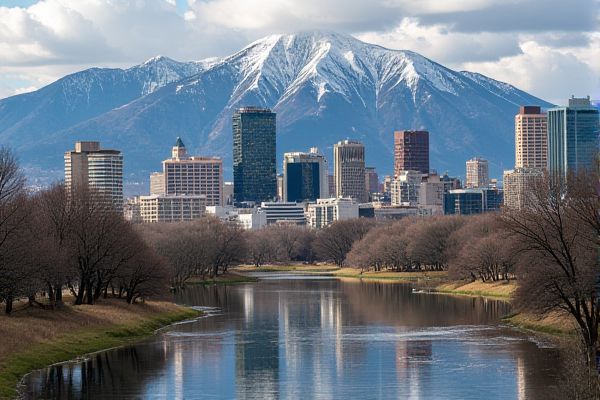
What to know as new resident in Colorado: Weather variation and layering clothes. Altitude adjustment tips. Cost of living insights. Recreational marijuana laws. Outdoor activities and trails. Wildlife encounters and safety. Colorado driving conditions. Local culture and neighborhoods. Public transportation options. Water conservation practices.
Weather variation and layering clothes
Colorado experiences all four seasons with significant weather variations: hot and dry summers, cool to cold winters with melting snow, unpredictable springs with rain, snow, and hail, and mild falls with rain showers. To adapt, it is crucial to layer clothing effectively, using a base layer for moisture management, mid-layers for insulation, and an outer layer for wind and water protection, especially given the state's high winds and dry climate. For more information on how to adjust to these varying conditions, check out the insights on Colorado Weather. Proper preparation ensures you enjoy all that Colorado's dynamic climate has to offer throughout the year.
Altitude adjustment tips
Adjusting to Colorado's altitude requires several strategies to ensure a comfortable and healthy experience. Start by drinking lots of water to combat dehydration and reduce your exercise initially to allow your body to adapt. It's crucial to get enough sleep and limit alcohol intake, which can exacerbate altitude sickness symptoms such as shortness of breath and headaches. Gradually ascending to higher altitudes helps your body adjust to the changes in oxygen levels, so try to avoid rapid ascents and maintain a balanced diet rich in carbohydrates, proteins, and healthy fats. Consulting a doctor about any health conditions and carefully planning your itinerary with gradual elevation increases is also wise. Consider spending 24 to 48 hours at each 1,000-foot gain and perhaps stay at intermediate altitudes like Denver or Colorado Springs before ascending further. For more detailed guidance on acclimatizing to the altitude, visit Inaraft's blog, which offers tips on how to adjust comfortably and safely to the altitude in Colorado.
Cost of living insights
The average cost of living in Colorado reaches $53,374 per person each year, with major expenses centered around housing, transportation, and daily necessities. The housing market reflects an average home value of $553,692, while renting averages at $1,677 monthly. Additionally, utilities contribute around $370 monthly to the overall cost, and transportation expenses climb to over $9,000 annually for a single adult. Groceries also significantly impact budgets, with an estimated monthly cost of $1,366 for a family of four. For a deeper understanding of these expenses, you can explore more at Unbiased.
Recreational marijuana laws
In Colorado, adults 21 and older can possess up to one ounce of marijuana, grow up to six plants privately with no more than three flowering at a time, and purchase marijuana from licensed retailers. Consumption is allowed in private locations, not in public or on federal lands, and driving under the influence of marijuana is subject to strict regulations and penalties. For more detailed information, you can visit the official Colorado Marijuana Law website.
Outdoor activities and trails
As a new resident in Colorado, you should know that the state offers extensive outdoor activities, particularly through the Colorado Trail, a nearly 500-mile trail from Denver to Durango that passes through eight mountain ranges, seven national forests, and six wilderness areas. This trail is suitable for hiking, backpacking, mountain biking, and horseback riding. Colorado provides a vast array of hiking trails, including over 39,000 miles of trails, 58 14ers, and numerous state and national parks, offering diverse landscapes from high-desert routes to mountainous trails with alpine lakes. This extensive network of trails and parks is well supported with resources like park visitor centers for trail maps and advice on trail suitability. For more information and maps, visit the Colorado Trail website, a valuable resource for enthusiasts seeking to explore these breathtaking landscapes.
Wildlife encounters and safety
As a new resident in Colorado, it is crucial to respect wildlife by keeping a safe distance, avoiding feeding or harassing animals, and being aware of your surroundings to prevent encounters. For further guidance, visit the Crossing Paths with Wildlife page. Follow guidelines such as hiking during daylight, staying in groups, and using bear deterrents and noise makers to minimize the risk of wildlife conflicts.
Colorado driving conditions
As a new resident in Colorado, it is crucial to stay updated on road conditions, especially on major routes like I-70, which can be affected by icy spots, snow, and other weather-related hazards. Utilizing resources like the CDOT Traffic Alerts and road condition reports is essential for safe driving.
Local culture and neighborhoods
Colorado is rich in local culture, with numerous Creative Districts across the state, each offering unique artistic experiences, historic buildings, galleries, and community events that reflect the diverse cultural heritage of its neighborhoods. Notable districts include Pueblo's Creative Corridor, Telluride's Arts District, and Denver's Golden Triangle and Westwood/BuCu Creative Districts. In addition to artistic endeavors, Denver's Multicultural Neighborhoods showcase a rich tapestry of global cultures. The Highland neighborhood is home to a vibrant Latin American community, Five Points highlights African American history, and South Federal Boulevard features Asian and Latino cultures, each offering distinct cultural experiences through their shops, restaurants, and cultural institutions.
Public transportation options
As a new resident in Colorado, you can utilize the Bustang express bus service, which connects major populations and employment centers along the I-25 and I-70 corridors, offering amenities like Wi-Fi, bathrooms, and wheelchair accessibility. Additionally, the Regional Transportation District (RTD) provides an extensive network of buses, light rail, and commuter rail services in the Denver metro area, with options for planning trips and various fare packages available.
Water conservation practices
As a new resident in Colorado, it's important to know about various water conservation practices, including outdoor watering restrictions, rainwater harvesting, greywater reuse, and the use of high-efficiency fixtures. These practices help reduce water demand, with measures such as mandatory watering restrictions showing significant reductions in water use, and initiatives like Rainwater Harvesting and greywater reuse also contributing to conservation efforts.
